Can French Bulldogs climb Stairs?

As we welcome these charming French Bulldogs into our homes, the question of their ability to navigate stairs arises. “Can French Bulldogs climb stairs?”
Certainly! “French Bulldogs can climb stairs, but their unique physique requires careful training. Gradual introduction and positive reinforcement ensure a safe and confident ascent.”
This inquiry unveils a fascinating journey into the world of canine physiology and behavior. In this guide, we embark on an exploration, unraveling the unique considerations that accompany our French Bulldog friends when faced with staircases.
From their distinctive physical traits to potential challenges, join us on a quest for understanding, as we provide insights and practical tips to ensure a safe and delightful stair-climbing experience for our beloved French Bulldogs.
Do French Bulldogs Need Ramps?
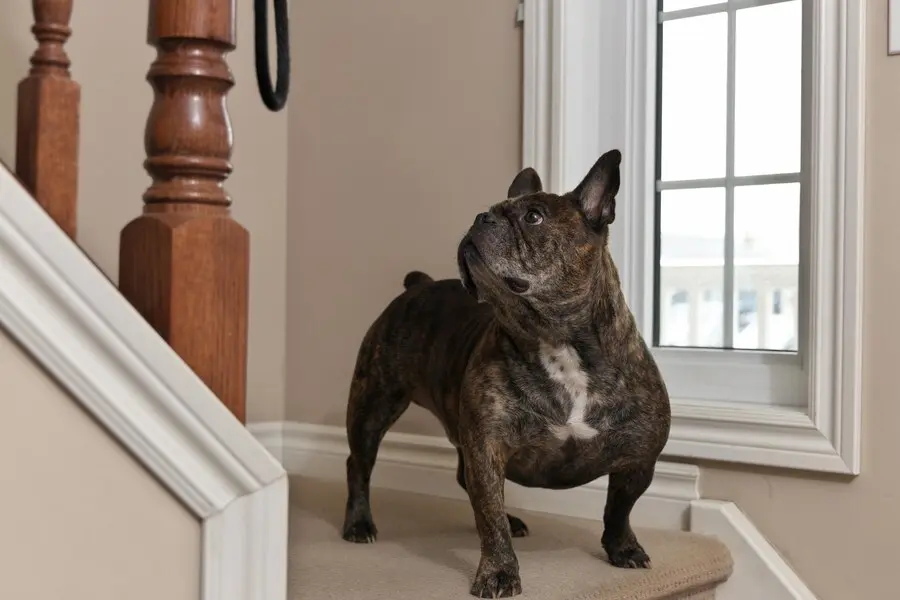
French Bulldogs, renowned for their distinctive physique and charming demeanor, often benefit from the thoughtful inclusion of ramps in their living spaces. The question of whether French Bulldogs need ramps revolves around their unique anatomical features, particularly their brachycephalic skull structure and robust muscular build.
Ramps prove to be valuable aids for these compact canines, providing a gentle and accessible alternative to navigate various surfaces. Considering their potential susceptibility to joint issues, ramps offer a practical solution to enhance their mobility while minimizing strain.
In essence, incorporating ramps aligns with responsible pet care, contributing to the overall well-being of these beloved companions.
When Can French Bulldogs climb Stairs?
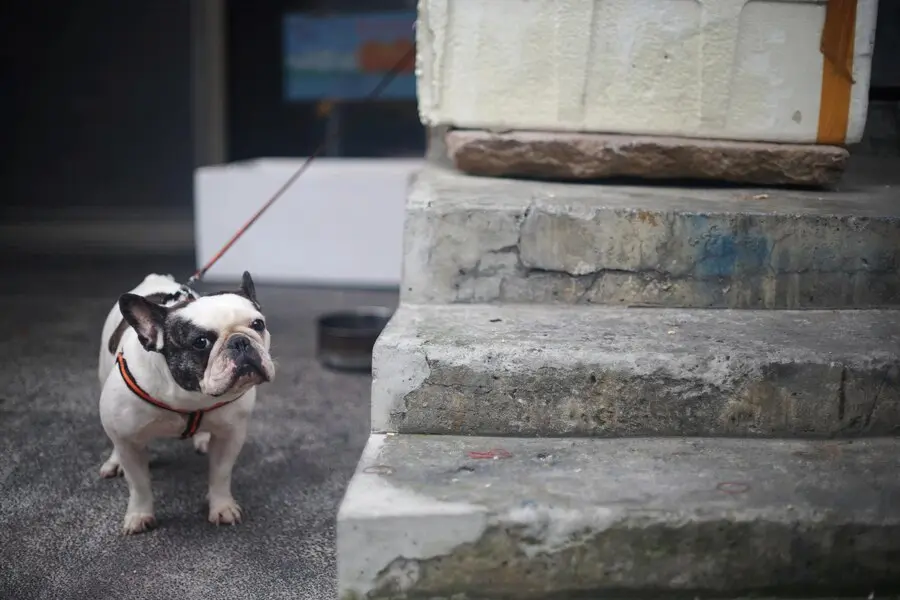
Determining the opportune moment for introducing French Bulldogs to the challenge of stairs is pivotal in ensuring their physical well-being. French Bulldogs undergo distinct developmental stages, and it’s crucial to consider these phases when contemplating when they can climb stairs.
Generally, around three to four months of age, French Bulldogs may start developing the coordination and strength required for stair navigation. However, each Frenchie is unique, and factors like size, health, and individual temperament play significant roles.
A gradual and patient approach is essential, observing your furry companion’s readiness and providing positive reinforcement as they embark on the exciting journey of conquering stairs in their own time.
Are Stairs Bad for French Bulldogs?

The impact of stairs on French Bulldogs raises concerns due to their unique anatomy. The brachycephalic nature of French Bulldogs, characterized by a short skull and compressed airways, can make stair climbing challenging.
Stairs may exacerbate respiratory difficulties in these adorable companions, particularly in warmer weather. Moreover, the strain on their joints and muscles during ascent and descent could contribute to health issues, especially in older or less agile French Bulldogs.
While stairs can present potential risks, careful management, gradual introduction, and consideration of individual health factors can mitigate these concerns. Responsible pet owners can create a safe environment by monitoring their French Bulldogs’ stair activity, thus ensuring a balanced approach to their well-being.
Stairs Problems and Dangers for French Bulldogs
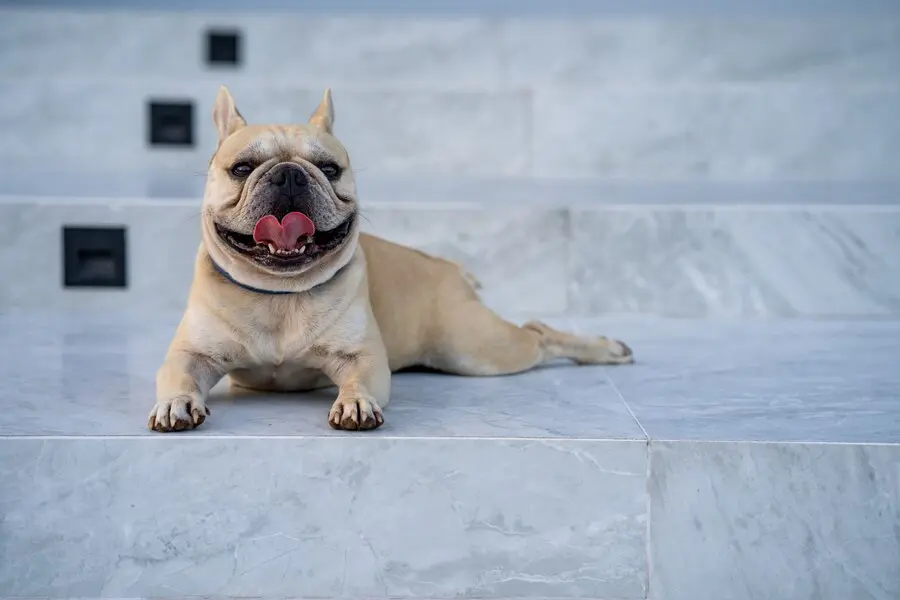
Bringing a French Bulldog into your home is exciting, but their unique features pose challenges when it comes to stairs. Understanding and addressing these issues are crucial for ensuring the safety and well-being of these delightful companions.
- Physical Limitations: French Bulldogs’ short legs, stout bodies, and brachycephalic features make stair negotiation challenging. Recognizing these limitations is essential to creating a safe environment for your furry friend.
- Health Concerns: Respiratory challenges and potential joint and spinal issues can arise due to their anatomy. Alternative solutions, such as ramps, can mitigate these health risks associated with climbing stairs.
- Behavioral Considerations: Stairs may trigger anxiety in French Bulldogs, leading to behavioral issues. Patience and positive reinforcement are key to helping them adapt gradually.
- Supervision Matters: Regardless of their comfort level, supervision is crucial. Regular veterinary check-ups can identify emerging health issues exacerbated by stair usage.
Health and Joint Issues in French Bulldogs
French Bulldogs are prone to health and joint issues, including IVDD (Intervertebral Disc Disease). Understand the connection between their unique anatomy and potential health challenges.
French Bulldogs and IVDD
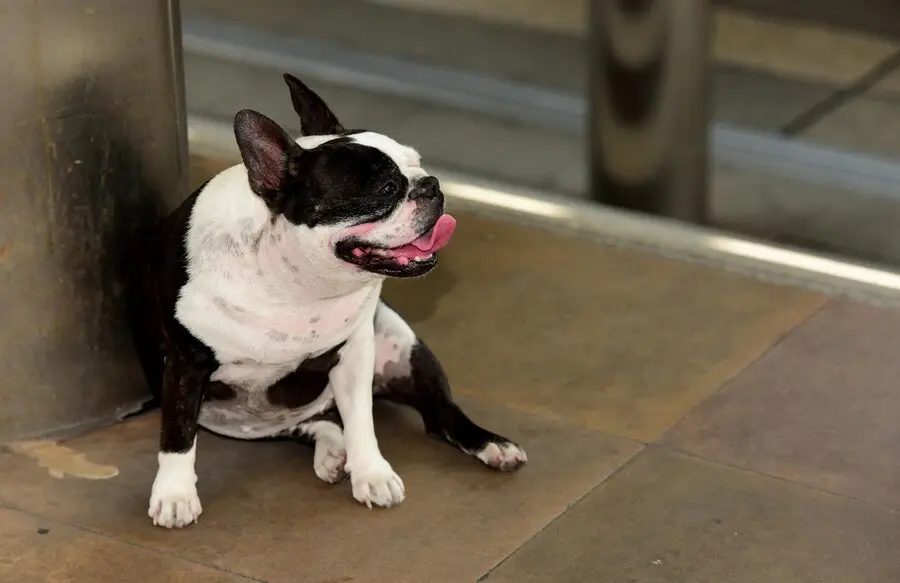
French Bulldogs, with their distinctive physique and endearing personality, face a notable health concern known as Intervertebral Disc Disease (IVDD) unfolds as a complex condition where the discs cushioning the vertebrae in the spinal column bulge or rupture into the space of the spinal cord. This occurrence exerts pressure on the nerves within the spinal cord, resulting in sensations of pain, potential nerve damage, and, in severe cases, paralysis.
In the realm of French Bulldogs, IVDD is not an abrupt assailant; it’s a gradual process that stealthily affects the spinal cord over time. The discs undergo a daily weakening, and many Frenchies may live with latent IVDD, its subtle presence only revealed when triggered.
Picture a seemingly healthy French Bulldog maneuvering a flight of stairs routinely. Despite outward appearances, the cumulative weakening of spinal discs persists until an unforeseen trigger, be it a fall or an abrupt jump, precipitates the disc’s rupture. This sudden event ushers in an acute phase of the disease, bringing the latent IVDD to the forefront of the Frenchie’s health landscape.
Symptoms of IVDD in French Bulldogs
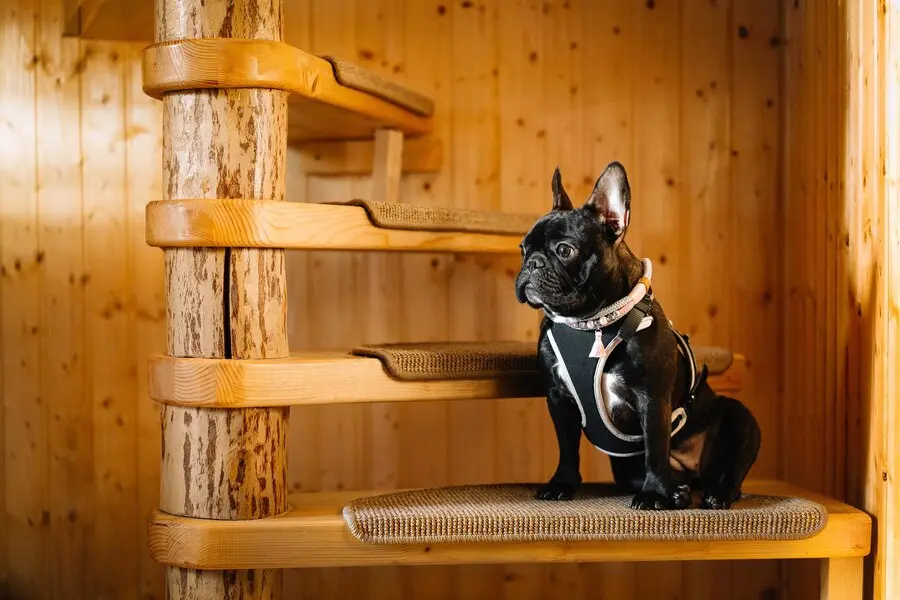
Since IVDD is so common in Frenchies, every French Bulldog owner needs to know what the symptoms are, as with any disease, Prompt recognition of the symptoms of IVDD in French bulldogs and immediate medical attention is incredibly important for a quick recovery process. The intervertebral discs are basically the shock absorbers of the spine. If strenuous activities continue while they are unable to perform that function, more things will go wrong.
Should you observe any of these indicators in your French Bulldog, prompt veterinary consultation is strongly advised to ensure timely and effective management:
- Cries of Distress: When grappling with IVDD, French Bulldogs may exhibit cries of distress, vocalizing their discomfort and pain. These cries can range from subtle whimpers to more pronounced howls, serving as audible cues for owners to recognize and address potential spinal issues.
- Excessive Panting: A common indicator of discomfort in French Bulldogs with IVDD is excessive panting. This heightened respiratory activity can be an instinctive response to pain, signaling the need for careful observation and intervention.
- Buckling Under: The physical manifestation of IVDD often includes a noticeable buckling under pressure. French Bulldogs may struggle to maintain their usual posture, showcasing an evident change in their ability to support their body weight.
- Loss of Bladder or Bowel Control: As IVDD progresses, French Bulldogs may experience a loss of bladder or bowel control. This is a critical symptom requiring immediate attention, highlighting the urgency of veterinary intervention.
- Muscle Spasms in the Back or Neck: Muscle spasms, particularly in the back or neck, can accompany IVDD in French Bulldogs. These involuntary contractions are indicative of the strain placed on the spine, emphasizing the need for a thorough examination by a veterinary professional.
- Reluctance to Look Up or Lift the Head: French Bulldogs with IVDD often exhibit a reluctance to look up or lift their heads. This behavioral change reflects the discomfort they experience in the neck or upper spine region.
- Pain and Weakness in Hind Legs: IVDD can manifest as pain and weakness in the hind legs of French Bulldogs. This impediment to normal mobility is a crucial symptom that necessitates immediate attention to prevent further complications.
- Paralysis: In severe cases, IVDD can lead to paralysis. French Bulldogs may lose complete control over their limbs, emphasizing the critical nature of timely medical intervention.
- Decreased Appetite and Activity Level: French Bulldogs suffering from IVDD may display a decreased appetite and activity level. This change in behavior is a response to the overall discomfort and pain they endure.
- Consistent Stumbling and Falling: A noticeable sign of IVDD is the consistent stumbling and falling of French Bulldogs. This lack of coordination highlights the challenges they face in maintaining balance and mobility.
- Tightened Belly: A tightened belly can be an indication of discomfort associated with IVDD. French Bulldogs may exhibit abdominal tension as a reflex to protect the affected spinal area.
- Crying Out Due to Pain: Crying out due to pain is a poignant symptom of IVDD in French Bulldogs. These audible expressions of distress necessitate immediate attention and a comprehensive assessment by a veterinary professional.
- Inability to Walk Normally: Progression of IVDD may result in an inability for French Bulldogs to walk normally. This impairment in their gait further underscores the urgency of seeking veterinary care.
- Reluctance to Jump: French Bulldogs with IVDD often display a reluctance to jump. This hesitancy stems from the pain and discomfort associated with spinal issues, prompting a more cautious approach to physical activities.
Treatment of IVDD in Frenchie dogs
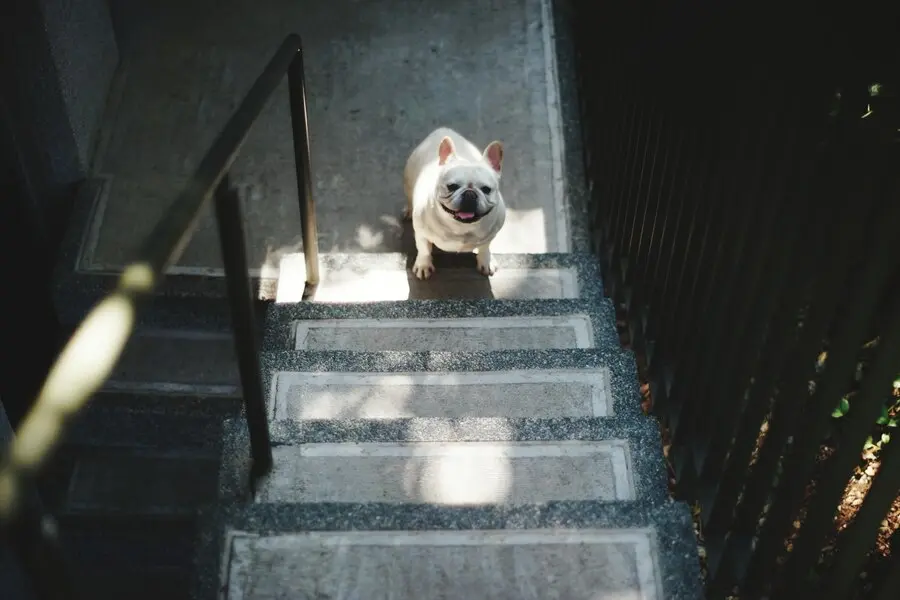
Intervertebral Disc Disease (IVDD) poses a unique set of challenges for French Bulldogs, and understanding the diverse treatment options is paramount for their well-being.
Conservative Measures: Rest and Medication
The initial approach often involves conservative measures. Strict rest is prescribed to limit physical activity, allowing the affected discs to recuperate. Medications, including anti-inflammatories, pain relievers, and muscle relaxants, play a crucial role in managing pain and facilitating the healing process. This combination seeks to alleviate discomfort and curb inflammation, promoting a gradual but steady recovery.
Surgical Intervention: A Precision Endeavor
In cases where conservative treatments fall short, surgical intervention becomes a pivotal consideration. Surgical procedures, such as hemilaminectomy or fenestration, aim to address the root cause of the issue by removing or decompressing the problematic disc material. Each surgery is a precision endeavor, tailored to the specific characteristics of the disc herniation and the individual health profile of the French Bulldog.
How Effective are IVDD Treatments?
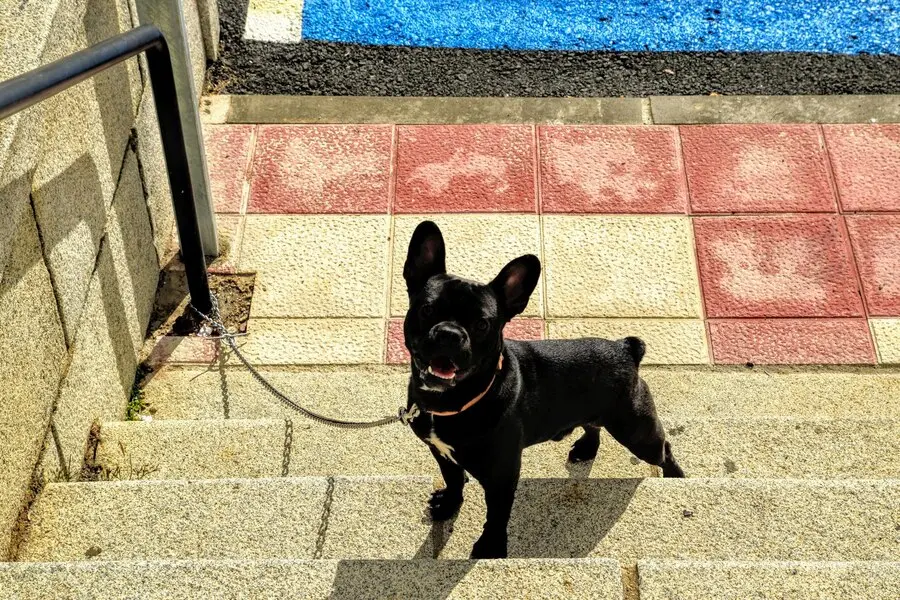
The effectiveness of IVDD treatments in French Bulldogs is a multifaceted consideration. Success hinges on a spectrum of factors, including the stage of the disease, the chosen treatment approach, and the overall health and resilience of the individual dog.
For those opting for the rest and medication route, diligent implementation in the early stages often yields positive outcomes. French Bulldogs regain mobility, and discomfort subsides, offering a promising trajectory for recovery.
In cases where surgical intervention becomes imperative, success is contingent on timely diagnosis, a tailored surgical plan, and attentive postoperative care. Each case is a unique tapestry of variables, and while success rates may vary, the overarching goal is to enhance the well-being and vitality of these cherished companions.
Preventing IVDD in French Bulldogs
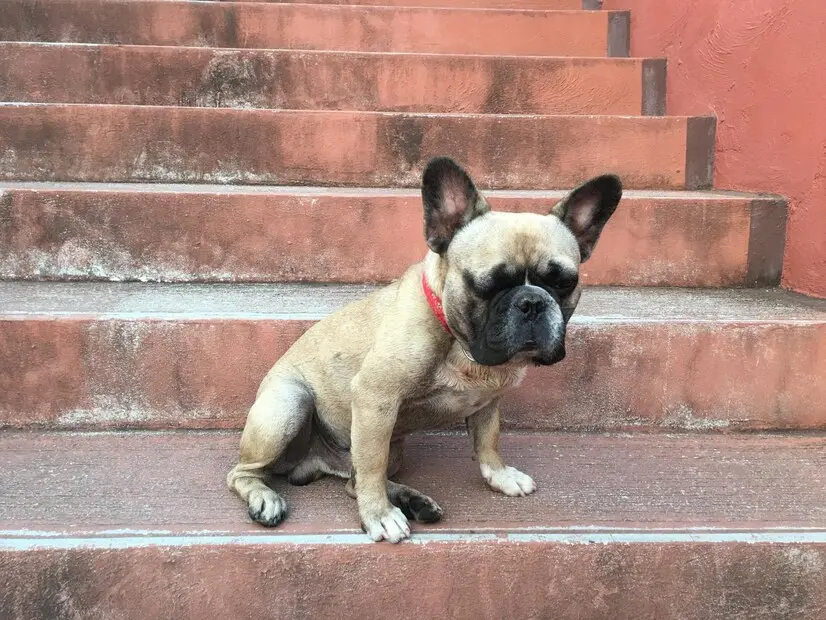
In your journey as a devoted French Bulldog owner, engaging in a dialogue with your veterinarian becomes paramount. Gathering comprehensive insights on potential risks and preventive strategies for Intervertebral Disc Disease (IVDD) is an essential step in ensuring the well-being of your Frenchie.
While not every French Bulldog succumbs to IVDD, their genetic predisposition doesn’t guarantee affliction. Yet, adherence to preventive measures is pivotal, significantly reducing the likelihood of your Frenchie experiencing the impacts of this condition.
- Maintain your French Bulldog’s Optimal Health and Leanness: Ensuring the optimal health and leanness of your French Bulldog is a foundational step in preventing Intervertebral Disc Disease (IVDD). This involves a balanced combination of regular exercise tailored to their needs and a carefully curated diet. Keep a keen eye on their weight, as excess pounds can strain the spine, potentially exacerbating the risk of IVDD.
- Use a Harness Instead of a Collar: The choice between a harness and a collar significantly impacts the spinal health of your French Bulldog. Unlike collars that can exert pressure on the neck, potentially impacting the spine, harnesses distribute force more evenly across the body. Opting for a harness is a preventive measure, reducing the strain on the neck and potentially lowering the risk of IVDD.
- Provide a Nutritious Diet: Nutrition plays a pivotal role in the overall well-being of French Bulldogs. A diet rich in essential nutrients, including omega-3 fatty acids, supports joint health. Consult with your veterinarian to formulate a nutrition plan that aligns with the specific needs of your Frenchie, contributing to their overall health and potentially reducing the risk of IVDD.
- Prevent Excessive Jumping: French Bulldogs, with their playful disposition, may be prone to enthusiastic jumping. However, excessive jumping can exert considerable stress on their spine, increasing their vulnerability to IVDD. Encourage more controlled activities and discourage behaviors that involve excessive leaps, especially from elevated surfaces.
- Utilize Ramps and Stairs Specifically Designed for French Bulldogs: Investing in ramps and stairs specifically designed for French Bulldogs can be a game-changer in preventing IVDD. These assistive tools provide a gentler ascent and descent, minimizing the strain on their spine. Incorporating such aids into your Frenchie’s environment demonstrates foresight in safeguarding their spinal health.
- Delay Spaying or Neutering Until They Reach Full Maturity: Delaying the spaying or neutering of French Bulldogs until they reach full maturity is a strategic measure. Premature alterations to their hormonal balance can impact the development of their musculoskeletal system. Allowing them to reach full maturity before such procedures minimizes potential disruptions, contributing to a more resilient spine.
How to train your French Bulldog to climb stairs

Training your French Bulldog to navigate stairs is a gradual and patient process that requires positive reinforcement. Begin by introducing your Frenchie to the bottom step, allowing them to explore at their own pace. Use treats or their favorite toys to create a positive association with the stairs.
Gently encourage them to take a step at a time, praising and rewarding each successful attempt. If your French Bulldog shows hesitation or fear, refrain from forcing them and instead offer reassurance.
Consistency is key, so make these training sessions a regular part of their routine. As your Frenchie gains confidence, gradually increase the number of steps, celebrating their progress with enthusiasm and treats.
Stairs Made for French Bulldogs
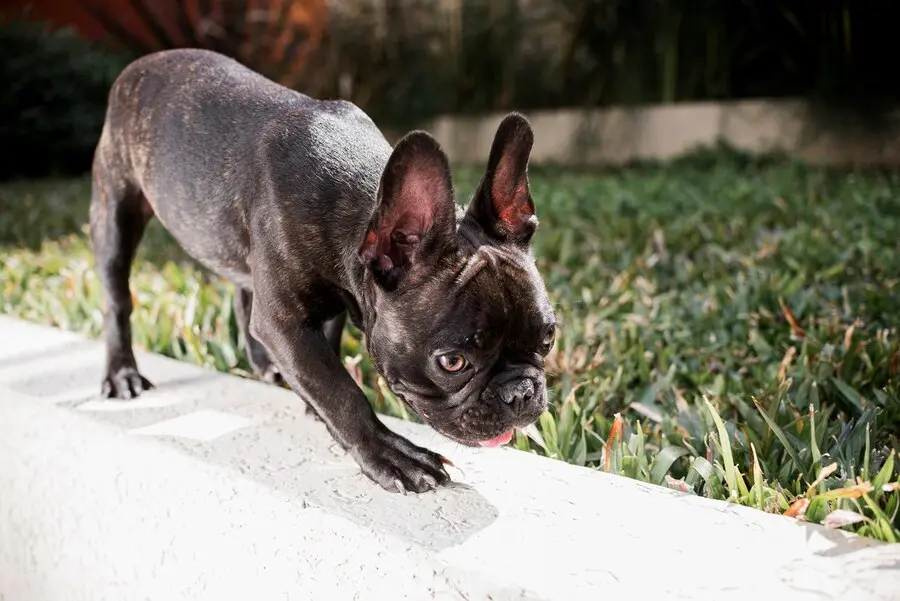
Specially designed stairs for French Bulldogs are a thoughtful solution tailored to meet the unique needs of these delightful companions. Crafted with meticulous attention to detail, these stairs offer a gentle and accommodating incline, recognizing the French Bulldog’s distinctive physique and potential vulnerability to spinal issues.
The step height is optimized for their comfort, facilitating easy ascension and descent without putting undue stress on their joints. The construction materials prioritize both durability and paw-friendliness, providing a secure and non-slip surface.
These purpose-built stairs serve as an essential accessory, enabling French Bulldogs to access elevated surfaces with ease, promoting independence, and, crucially, contributing to their overall well-being by mitigating the risk of strain on their spine.
Stair Safety Tips for French Bulldogs
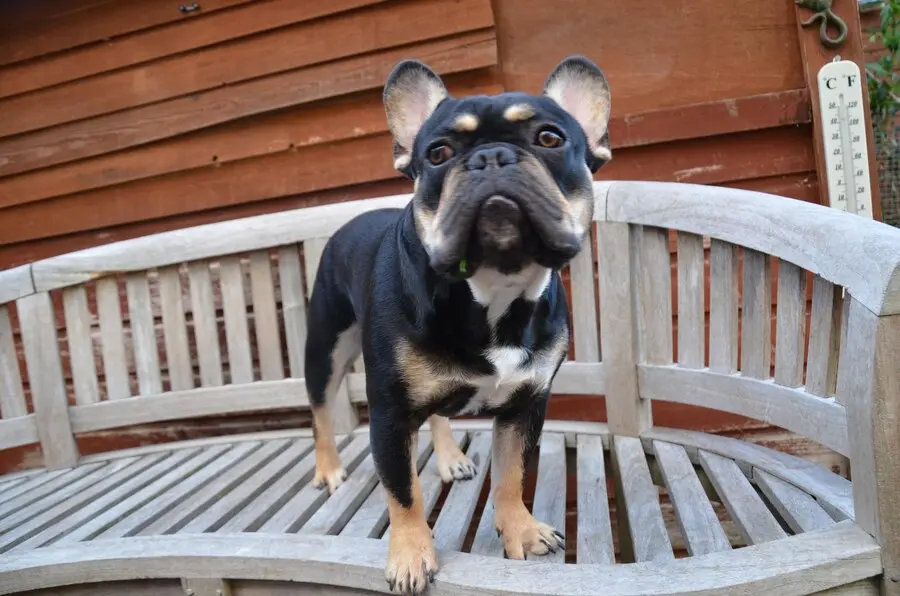
Ensuring stair safety for French Bulldogs involves implementing thoughtful measures to protect their well-being. First and foremost, maintaining a well-lit stairway environment is essential, as it aids visibility and reduces the likelihood of accidents.
Additionally, consider using non-slip stair treads or coverings to provide secure footing for your French Bulldog, minimizing the risk of slipping or skidding. Training your Frenchie to use the stairs with positive reinforcement and patience is crucial, encouraging confidence in navigating the steps.
If your French Bulldog exhibits reluctance or fear, avoid forcing them and instead offer reassurance and support. Regular veterinary check-ups can also help monitor their joint and spinal health. Implementing these stair safety tips ensures that your French Bulldog can move around their environment comfortably and safely.
Frequently Asked Questions
Are stairs good for French Bulldogs with arthritis?
Stairs can be challenging for French Bulldogs dealing with arthritis. The repetitive motion of climbing may exacerbate joint pain. Consider alternatives like ramps to provide a more joint-friendly means of mobility.
What causes paralysis in French Bulldogs?
Paralysis in French Bulldogs can stem from various factors, with Intervertebral Disc Disease (IVDD) being a common culprit. Disc herniation, trauma, or neurological issues may lead to paralysis. Early detection, preventive measures, and timely veterinary attention are crucial in addressing and managing such conditions.
How do I get my French Bulldog to stop being scared of stairs?
Helping your French Bulldog overcome stair-related fears requires patience and positive reinforcement. Start by introducing them to the bottom step, using treats and praise to create a positive association. Gradually progress at their pace, offering reassurance to build confidence. Consistent, positive exposure can help alleviate their fear over time.
Final words
In conclusion, the ability of French Bulldogs to climb stairs is a nuanced consideration influenced by various factors, including their individual health, age, and training. While many French Bulldogs can adeptly navigate stairs, it’s crucial for owners to be attuned to their pet’s specific needs and any potential health concerns, particularly related to spinal issues like Intervertebral Disc Disease (IVDD).
Implementing preventive measures, such as providing purpose-built stairs and incorporating safety tips, can enhance their mobility and well-being. Understanding the unique characteristics of French Bulldogs and tailoring their environment accordingly ensures that they can enjoy a full and comfortable life, whether ascending stairs or exploring the world at ground level.
You may also like :




